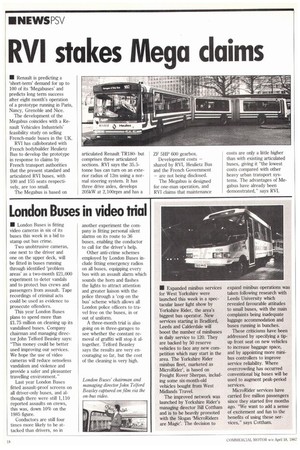London Buses in video trial
Page 20

If you've noticed an error in this article please click here to report it so we can fix it.
• London Buses is fitting video cameras in six of its buses this week in a bid to stamp out bus crime.
Two unobtrusive cameras, one next to the driver and one on the upper deck, will be fitted in buses running through identified 'problem areas' as a two-month 221,000 experiment to deter vandals and to protect bus crews and passengers from assault. Tape recordings of criminal acts could be used as evidence to prosecute offenders.
This year London Buses plans to spend more than £1.75 million on cleaning up its vandalised buses. Company chairman and managing director John Telford Beasley says: "This money could be better used improving our services. We hope the use of video cameras will reduce senseless vandalism and violence and provide a safer and pleasanter travelling environment."
Last year London Buses fitted assault-proof screens on all driver-only buses, and although there were still 1,110 reported assaults on crews, this was, down 10% on the 1985 figure.
Conductors are still four times more likely to be attacked than drivers, so in another experiment the company is fitting personal silent alarms on its route to 36 buses, enabling the conductor to call for the driver's help.
Other anti-crime schemes employed by London Buses include fitting emergency radios on all buses, equipping every bus with an assault alarm which sounds the horn and flashes the lights to attract attention and greater liaison with the police through a 'cop on the bus' scheme which allows all London police officers to travel free on the buses, in or out of uniform.
A three-month trial is also going on in three-garages to see whether the constant removal of graffiti will stop it altogether. Telford Beasley says the results are very encouraging so far, but the cost of the cleaning is very high.




















































































